情态动词虚拟语气
中的情态动词和虚拟语气有哪些

中的情态动词和虚拟语气有哪些情态动词(Modal Verbs)是一类特殊的动词,在英语中常用来表达情态、态度、意愿、推测、能力、建议等含义,通常用来修饰其他动词。
而虚拟语气(Subjunctive Mood)是一种用来表示假设、愿望、建议、命令等非现实情况的语气。
情态动词一共有十个,它们分别是can、could、may、might、shall、should、will、would、must、ought to。
这些情态动词在语言表达中起到了很重要的作用,下面将对它们的具体用法进行介绍。
1. Can和CouldCan表示一种能力、可能性或许可性,用于表达某人能够完成某事。
Could表示过去或将来某个时间点的能力或可能性。
例如:- He can speak three languages fluently.(他能够流利地说三种语言。
)- Could you pass me the salt, please?(你能递给我盐吗?)2. May和MightMay表示许可、可能性或祝愿,用于表示允许某事发生或对现实情况的推测。
Might在语气上更加委婉,表达对现实情况的推测,表示较小的可能性。
例如:- May I borrow your pen?(我可以借用一下你的笔吗?)- I may/might go to the party tonight.(我可能今晚去参加派对。
)3. Shall和ShouldShall用于征询意见或提供建议,主要用于第一人称以及第三人称的单数和复数。
Should表示某事做起来更好,用于提出建议、义务或期望。
例如:- Shall we go out for dinner tonight?(我们今晚出去吃饭吧?)- You should take a break and relax.(你应该休息一下,放松一下。
)4. Will和WouldWill表示意愿、决心或预测,表示对未来的确定或实际情况。
虚拟语气与情态动词的区别及用法解析

虚拟语气与情态动词的区别及用法解析虚拟语气和情态动词是语法中两个不同的概念,但在一些语法规则和用法上有一些相似之处。
虚拟语气是一种用来表示假设、愿望、建议、要求等非现实情况的语气,它并不是真实存在的,而是对虚构的事件或状态进行描述。
而情态动词则是一类用于表示说话人的态度、推测、能力、许可等情态意义的动词。
一、虚拟语气的用法1. 假设虚拟语气经常用于表示虚拟的假设情况,即与事实相反或不可能实现的情况。
常见的虚拟语气形式包括“如果…(过去式)”,“要是…(过去式)”等。
例如:- If I were a bird, I would fly freely in the sky.如果我是一只鸟,我就可以在天空中自由飞翔。
2. 愿望虚拟语气还可以用于表示愿望,即对现实情况的一种虚构或想象。
常见的虚拟语气形式包括“希望…(过去式)”,“但愿…(过去式)”等。
例如:- I wish I had studied harder last night.我希望昨晚学习更努力一些。
3. 建议、要求虚拟语气还可以用于表示建议、要求等情况。
常见的虚拟语气形式包括“(要求、建议)+过去式”。
例如:- The doctor suggested that I take some rest.医生建议我休息一下。
二、情态动词的用法1. 表示能力、推测情态动词可以用来表示说话人的能力或对某种情况的判断。
常见的情态动词有can、could、may、might等。
例如:- She can swim very well.她游泳技术非常好。
2. 表示许可、允许情态动词还可以表示许可或允许的意思。
常见的情态动词有can、may等。
例如:- Can I borrow your pen?我能借用你的笔吗?3. 表示义务、应该情态动词也可以表示说话人对某种行为或义务的责任或要求。
常见的情态动词有should、ought to等。
例如:- You should apologize to him for your mistake.你应该为你的错误向他道歉。
情态动词和虚拟语气

谓语动词情态动词、虚拟语气要点一情态动词的基本用法,could温馨提示can有时也用于肯定句,表示理论上的可能性或一时的情况;常译为“有时会”;,might温馨提示may表示请求许可时,其否定回答一般用mustn’t;may not意为“可能不”,而can’t意为“不可能”; ,would温馨提示would表示过去的习惯时仅指动作,而且不与现在作对比;used to表示过去的习惯动作或状态,而且与现在作对比,说明现在这种动作或状态已经不存在;,should,ought to,have to温馨提示1在回答must的问句时,否定回答通常用needn’t或don’t have to;2 mustn’t表示“禁止;不许”;而don’t have to表示“不必”;3 must只有一种形式,而have to有人称、时态的变化;的用法的用法温馨提示1dare用作情态动词有dare,dared两种形式;2dare用作实义动词,后接不定式,不定式符号to可省去,但dare以动词-ing形式出现时,不定式符号to不能省略;要点二“情态动词+have done ”的用法have done表示对过去已发生的事情进行肯定的推断,只用于肯定句中,意为“一定,必定”,其否定形式为:can’t/cannot have done;It must have rained last night,for the road was quite wet.昨晚肯定下雨了,因为路面十分潮湿;I saw Mr Wang just can’t have gone abroad.刚刚我还看见王先生了,他不可能已经出国了;have done意为“本来可以……,本来能够……”,表示虚拟语气;You could have made greater progress,but you didn’t try your best.你本来可以取得更大的进步,但是你没有努力;might have done表示对过去已发生的事情进行推断,意为“可能/或许已经……”;其否定形式为: may/might not have done意为“可能没有做……”;It’s no use going to his may not have gone may have gone somewhere else.去他家没用; 他可能没有回家,可能已经去了别的地方;ought to have done表示本应该做某事,却没有做,含有责备或后悔之意;其否定形式为should not/ought not to have done表示“本不该做某事却做了”;With all the work finished,I should have gone to the party last night.所有的工作都做完了,我昨晚本该去参加宴会的;You ought not to have made fun of is not the one you laugh at but learn from.你本不应该取笑他的;他不是你要嘲笑的人而是你应该学习的榜样;’t have done表示“本没有必要做某事却做了”,多用于否定句中;You needn’t have waken me up;I don’t have to go to work today.你本不必叫醒我的;我今天不上班;注意:needn’t do表示“没有必要去做某事”,时间上应该是现在或将来;You needn’t telephone him now,for he isn’t at home.你现在不必打电话给他,因为他不在家;have done表示“本来会做……而事实上未做到”;Without your help,I wouldn’t have achieved so much.没有你的帮助,我是不会取得如此大的成绩的;要点三虚拟语气在非真实条件句中的用法(一)基本用法二混合虚拟语气有时非真实条件句的动作和主句的动作不同时发生,或主从句的动作有一个是事实,这种情况下谓语动词要根据各自的具体情况来确定;如:If he had worked hard at his lesson,he would be in college now.如果他努力学习,现在已经考上大学了;三含蓄虚拟语气有时非真实条件不是通过if引导的条件来表现的,而是通过一些词或短语来表示,如without,but for,otherwise,but等;如:I couldn’t have finished the work on time without your help.如果没有你的帮助,我无法按时完成这项工作;But for your timely warning,we would have got into great trouble.如果没有你及时的提醒,我们已陷入大麻烦里;四非真实条件句中省略if的用法如果非真实条件句中有had,were,should,可省略if,而将had,were,should提前形成部分倒装;如:Had he taken my advice,he would not have made such a mistake.如果他听取我的建议的话,他就不会犯这种错了;Should it be sunny tomorrow,we would go hiking.如果明天晴天,我们会去徒步旅行;Were there no air or water,there would be no living things on the earth.如果没有空气和水,地球上也不会有生命;要点四虚拟语气在其他从句中的应用一虚拟语气在名词性从句中的运用后面的宾语从句一般用虚拟语气,表示一种不可能实现的愿望;其谓语动词构成形式为:一般过去时宾语从句动作与wish同时;过去完成时宾语从句动作先于wish;could/would+动词原形宾语从句动作后于wish;如:How I wish you had joined us in singing the song我多么希望你加入我们一起唱歌;I wish you could accompany me to Shanghai next week.我希望你下周陪我去上海;2.在would rather/prefer后的宾语从句中;其宾语从句的谓语动词用一般过去时be用were表示对现在或将来的虚拟:宾语从句谓语动词用过去完成时表示对过去的虚拟;如:I would rather they didn’t hear of the news.我宁愿他们没听到那个消息;对现在的虚拟I would rather/prefer I had not told him the bad news.我宁愿没告诉他那个坏消息;对过去的虚拟3.虚拟语气在as if/as though引导的从句中的运用如果as if/as though引导的从句谓语动词所表达的动作与主句谓语动词所表达的动作同时发生,as if/as though引导的从句谓语动词用一般过去时;如果as if/as though引导的从句谓语动词所表达的动作先于主句谓语动词所表达的动作,as if/as though引导的从句谓语动词用过去完成时;如果as if/as though引导的从句谓语动词所表达的动作后于主句谓语动词所表达的动作,as if/as though引导的从句谓语动词用过去将来时;如:He looks as if he were an artist.同时他看起来像个艺术家;She speaks English so fluently as if she had studied English in America.先于她讲英语如此流利,好像她在美国学过英语一样;He learns English so hard as if he would go to the 后于他如此努力地学英语,好像他要去美国一样;4.用于表示建议、愿望、命令等动词后的宾语从句中;常见的动词有:demand,order,require,insist,suggest,propose,advise,request,urge,command,desire,recommend等;这些动词后的宾语从句中的虚拟语气结构为“should+动词原形”;如:He recommended that the task should be finished tomorrow.他建议明天一定把任务完成;二虚拟语气在其他句型中的用法is high timethat...句型中该句中,定语从句的谓语动词用一般过去时;此句型意为“现在该……”,用来表示提议;如:It is high time that you went to school.你该去上学了;if从句中的虚拟语气在even if/even though引导的让步状语从句中,表示与所发生的事实相反时,应采用虚拟语气,其让步状语从句中虚拟语气的构成形式与条件句中虚拟语气的构成形式相同;如:Nothing could have saved him even if he had been tended without delay.什么都挽救不了他,即使他的看护没有被延误;3.在其他状语从句中的虚拟语气在in case,lest,for fear that引导的状语从句中的虚拟语气,表示“以防,以免”,从句谓语动词常为“should+动词原形”;如:He took his raincoat with him in case it should rain.他带着雨衣以防下雨;4.用于if only引导的感叹句中If only+句子=How I wish+that从句that可省略.如:If only I were a flying bird=How I wish I were a flying bird我要是一只飞鸟该多好啊If only I had seen the film=How I wish I had seen the film我要是看了那部电影该多好啊练习题,the tallest boy in our class, easily reach the books on the top shelf.2017北京真题答案can解析考查情态动词;句意:塞缪尔是我们班最高的男生,他很轻松就能够到书架顶层上的书;表示能力,用can“能够”;room is a mess,but I clean it before I go out can do it in the morning.2017天津真题答案needn’t解析考查情态动词;句意:我的房间乱得一团糟,但是今晚出门前我不必打扫;我可以早上再打扫;根据后一句“我可以早上再打扫”可知,此处应用needn’t表示“不必做某事”;3.—Do you have Betty’s phone number—,I be able to reach her yesterday.2017天津真题答案wouldn’t have been解析考查虚拟语气;句意:——你有贝蒂的电话号码吗——是的;如果没有的话,昨天我就找不到她了;这是与过去事实相反的虚拟语气形式,空格所在的句子相当于主句,otherwise相当于一个条件状语从句,故用“情态动词+have done”的形式;you find bargains in London,it’s not generally a cheap place to shop.全国大纲真题答案can解析句意:尽管你在伦敦可能发现便宜货,但它总起来说还不是一个购物的便宜去处;表示可能性,故用can;go too coffee is still warm.浙江真题答案can’t have gone解析句意:乔治不可能走太远;他的咖啡还是温的;can’t have done表示对过去否定的推测,意为“不可能已做了……”;6.—Can’t you stay a little longer—It’s getting really go daughter is home alone.北京真题答案must解析句意:——你不能再多待会儿吗——太晚了;我必须要走了,我女儿一个人在家呢;由“时间不早了”和“女儿一个人在家”这两个条件可以推断出“我”必须要走了;所以填must;7.—Sorry,Mum I failed the job interview again.—Oh,it’s too have made full preparations.福建真题答案should解析句意:——对不起,妈妈;我面试又失败了;——噢,太糟糕了;你本应该做充分准备的;should have done形式表示对过去的推测,意为“本应该……”;I see it with my own eyes,I wouldn’t have believed it.北京真题答案hadn’t seen解析句意:如果不是亲眼看到,我是不会相信的;因为主句使用的是would have done的形式,所以从句使用过去完成时态,表示对过去的虚拟;is lucky we booked a room,or we have nowhere to stay now.安徽真题答案would have解析句意:幸运的是我们预定了一个房间,否则现在我们就没有地方待了;由时间状语now可知,主句是对现在的虚拟,所以使用would have;典例1 You be careful with the costs四川真题剖析must句意:你一定要小心使用这部相机;它花了不少钱呢后面一句It costs使用了一般现在时,表达事实情况,再根据句意,相机价格昂贵,所以一定must要小心使用;典例2 My book,The House of Hades,is have taken it陕西真题剖析could句意:我的书海兹的房屋不见了;是谁拿走了呢结合语境可知,此处表示对过去情况的推测,用在疑问句中,表达可能性,故填could;典例3 I still remember my happy childhood when my mother take me to Disneyland at weekends.四川真题剖析would句意:我仍然记得我的幸福童年,那时我母亲总会在周末带我去迪士尼乐园;would表示过去的一种习惯;one be more generous;he has a heart of gold.答案can/could解析句意:没有人比他更慷慨;他有一颗金子般的心;根据句意以及句子结构可知,此处是否定词和比较级连用表达最高级的含义,所以用can或could;door not open,no matter how hard she pushed.答案would解析句意:不管她怎么用力推,门就是打不开;主句有“即使尽力想让某事发生也达不到预期的效果”的含义,所以用would not 表达;sleep,although he tried to,when he got on such a hunt for an idea until he had caught it.答案couldn’t解析句意:当他苦苦想主意时,尽管他尽力去睡,但直到他想出主意来,他才能睡着;根据语境及“although he tried to”可知,此处说的是过去的能力,而且表示否定,填couldn’t;4.—What are you doing this Saturday—I’m not sure,but I go to the Rolling Stones concert.答案might/may解析句意:——本周六你打算干什么——我也不确定,但是我可能去听滚石乐队的音乐会;根据这里的“I’m not sure”可知,本句用might或may表示不确定的推测;not enjoy myself more—it was a perfect day.答案couldn’t have enjoyed解析句意:我从未玩得这么开心过——这是完美的一天;根据句意和结构可知,这里用couldn’t have done表示“不可能做过”,后面的enjoy...more是比较级,与not连用表示最高级的含义,意为“从未比这更高兴过”;children get lost in the wood;otherwise,they would have been at the lakeside camp as scheduled.答案must have got解析句意:孩子们一定是在树林里走丢了,否则,他们就会按照预定时间来到湖边的宿营地了;根据句意可知,这里表示对过去事情的肯定推测,所以要用must have done的结构;nobody gave him any help,he have done the research on his own.答案must解析句意:既然没有人给他任何帮助,他一定是自己做的那项研究;根据句意可知,这里是对过去事实的肯定推测,所以用must have done结构;8.—Why are your eyes so red You have slept well last night.—Yeah,I stayed up late writing a report.答案can’t/couldn’t解析句意:——你的眼睛为什么这么红你昨晚肯定没有睡好;——是的,我熬夜写了一篇报告;由题中的关键信息“stayed up late writing a report”可推测“昨晚没有睡好”,此处用can’t/couldn’t have done这一结构表示说话人对过去事情的比较肯定的否定推测,即“不可能”;9.—It rained cats and dogs this ’m glad we took an umbrella.—Yeah,we would have got wet all over if we have.答案hadn’t解析句意:——今天早上大雨滂沱;我非常高兴我们带了雨伞;——是的,如果我们不带雨伞的话一定全身都湿透了;根据句意和时间状语this morning可知,本句是与过去事实相反的虚拟语气,所以要用hadn’t,这是if we hadn’t taken an umbrella的省略;should not have laughed if I think you were serious.答案had thought解析句意:如果我当时想到你是认真的,我就不会笑了;if引导非真实条件句,根据主句的谓语动词should not have laughed可以推出,本句所表达的内容与过去事实相反,所以if引导的非真实条件句中应使用过去完成时;mom suggests that we eat out for a change this weekend.答案should eat解析句意:妈妈建议我们本周末出去吃饭来换换口味;表建议、命令类的词,如:suggest,propose,demand,request,order 等引导的宾语从句,谓语动词用“should+动词原形”的形式;go to my cousin’s birthday party last night,but I was not available.答案would/should have gone解析句意:要不是没时间,昨天晚上我就去参加我堂妹的生日聚会了;根据句意及时间状语last night可知,前一分句表示与过去事实相反的情况;often hear that children wish they be grown-ups,and that old people wish to be young.2017四川凉山州二次诊断答案were解析句意:我们经常听说孩子们希望长大,而老人们希望年轻;wish后的宾语从句一般用虚拟语气;设空处be与wish 同时发生,故用一般过去时,因此本题答案为were;would be much healthier now she not burdened herself with that much pressure from work when young.2017江苏淮安四次调研答案had解析句意:要不是她年轻时在工作上给自己施加那么大压力,现在她的身体会好得多;根据句意可知从句部分是与过去事实相反的虚拟语气,其谓语动词应为“had+过去分词”形式,本句中将if省略了,had提到句首,故设空处填had;old lady insisted that the young man had stolen her wallet and that he send to the police station.2017浙江艾青中学质检答案should be sent解析句意:那位老太太坚持说那个年轻人偷了她的钱包并坚持要把他送到警局;insist作“坚持要做某事”讲时,其宾语从句的谓语动词需用“should+动词原形”,should可以省略;wish I be at my sister’s wedding last Tuesday,but I was on a business trip in New York then.答案had been解析句意:我希望上个星期二我出席了姐姐的婚礼,但那时我正在纽约出差;wish后的宾语从句要用虚拟语气,对过去发生过的事情的虚拟要用过去完成时;’t handle the vase as if it made of steel.答案were解析句意:不要对待那个花瓶像它是由钢制成的一样;as if“仿佛,好像”;花瓶并非由钢铁制作,与事实相反,故用虚拟语气;又因前面动词“Don’t”可知是与现在事实相反,故用were;。
情态动词在虚拟语气中的特殊用法

情态动词在虚拟语气中的特殊用法
情态动词在虚拟语气中有以下几种用法:
1.与现在事实相反的情况:在这种情况下,主句的谓语动词使用“would+动
词原形”,而从句的谓语动词则使用“were+to+动词原形”或“动词的过去式”。
2.与将来事实相反的情况:与将来事实相反的虚拟语气可以通过以下几种形
式表示:主句使用“would+动词原形”,从句使用“were+to+动词原形”
或“动词的过去式”;主句使用“would+动词原形”,从句使用“should+动词原形”;主句和从句都使用“might+动词原形”。
3.与过去事实相反的情况:在这种情况下,主句的谓语动词使用
“would+have+过去分词”,而从句的谓语动词则使用“had+过去分词”。
此外,还有一些特殊用法,例如:在if引导的条件句中,如果从句使用了虚拟语气,而主句表示的是真实情况,则可以使用倒装句来避免混淆。
另外,在虚拟语气中,情态动词“should”也可以省略,直接使用动词原形来表示虚拟语气。
总之,情态动词在虚拟语气中有多种用法,通过灵活运用这些用法,可以增强语言的表达力和感染力。
情态动词在虚拟语气中的特殊用法及其含义

情态动词在虚拟语气中的特殊用法及其含义
情态动词在虚拟语气中的特殊用法主要有以下几种:
1.“would rather +宾语从句”:这种结构中的从句使用虚拟语气,表示
“宁愿……”。
2.例如:I would rather you came tomorrow. 我宁愿你明天来。
3.“It is (high) time +从句”:这种结构中的从句也使用虚拟语气,表示
“是时候做某事了”。
4.例如:It is high time we did something about it. 我们早该对此采取一些
措施了。
5.“if only”:这个词也用于虚拟语气,表示“要是……就好了”。
6.例如:If only I had known! 要是我早知道就好了!
7.“would/could/might/should have done”:这些结构表示对过去情
况的虚拟。
8.例如:I wish she would have done what she was told to do. 我希望她
已经按照指示做了该做的事。
9.“needn’t have done”:这个结构表示“本来不必做而做了”。
10.例如:I needn’t have hurried,for the party didn’t start till 8 o’
clock. 我本来不必匆忙,因为晚会8点才开始。
这些情态动词的特殊用法在日常交流中十分常见,但具体使用还需要根据语境来判断。
希望以上信息对您有所帮助!。
情态动词和虚拟语气
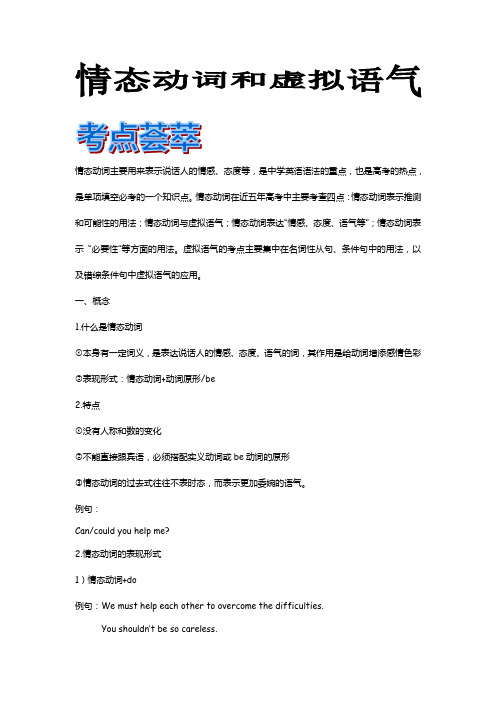
情态动词主要用来表示说话人的情感、态度等,是中学英语语法的重点,也是高考的热点,是单项填空必考的一个知识点。
情态动词在近五年高考中主要考查四点:情态动词表示推测和可能性的用法;情态动词与虚拟语气;情态动词表达“情感、态度、语气等”;情态动词表示“必要性”等方面的用法。
虚拟语气的考点主要集中在名词性从句、条件句中的用法,以及错综条件句中虚拟语气的应用。
一、概念1.什么是情态动词①本身有一定词义,是表达说话人的情感、态度、语气的词,其作用是给动词增添感情色彩②表现形式:情态动词+动词原形/be2.特点①没有人称和数的变化②不能直接跟宾语,必须搭配实义动词或be动词的原形③情态动词的过去式往往不表时态,而表示更加委婉的语气。
例句:Can/could you help me?2.情态动词的表现形式1)情态动词+do例句:We must help each other to overcome the difficulties.You shouldn’t be so careless.2)情态动词+be doing例句:She must be sleeping now.My mother may/might be cooking now3)情态动词+be done例句:Difficulties can and must be overcome.Something must be done to stop pollution.4)情态动词+have done例句:You ought to have come earlier.They might have finished the work.二、情态动词的分类1.只能作情态动词:must, can/could, may/might2.可作情态动词也可作助动词的:will/would, shall/should3.可作情态动词有可作实义动词的:need,dare4.具有情态动词特征的:ought to, have to, be able to三、分类讲解1.can /could1)表示能力:会,在表示过去的能力时用could例句:I can swim.Lucy can dance well and her mother could dance well when she was young.The cinema can seat 500 people.I could not read such an easy book when I was 7 years old.2)表允许,许可常用在口语中,此时could 不表示过去式,而表示语气上比can更客气。
语法专题7情态动词和虚拟语气

语法专题7情态动词和虚拟语⽓情态动词的⽤法情态动词表⽰说话⼈对某⼀动作或状态的态度,可以表⽰“可能”、“可以”、“需要”、“必须”或“应当”等之意。
情态动词没有⼈称和数的变化。
但不能单独作谓语动词⽤,必须和不带to的不定式连⽤构成谓语动词。
只有情态动词ought要和带to的动词不定式连⽤,在句中作谓语⽤。
将情态动词置于主语之前即构成其疑问式,在情态动词之后加not既构成其否定式。
现将各情态动词的基本⽤法分述如下:1、can和could (could为can的过去式) 的基本⽤法(1)表⽰能⼒,如:He can speak English better than you.(2)在疑问句和否定句中表⽰“怀疑”、“猜测”或“可能性”,如:Can thisgreen bike be Liu Dong's?(3)表⽰“许可”时can可以和may换⽤,如:You can (may) go home now.(4)如果要表⽰语⽓婉转,可⽤could代替can,这时could不再是can 的过去式,如:Could you come again tomorrow? (5)can和be able to 都可表⽰能⼒,两者在意思上没有什么区别。
但是can只能有现在式和过去式,⽽be able to则有更多的形式,如:He will be able to do thework better.2、may和might (might为may的过去式)的基本⽤法(1)表⽰允许或征询对⽅许可,有“可以”之意,如:You may use my dictionary. 在回答对⽅说“可以做某事”或“不可以做某事”时,⼀般多不⽤may或may not,以避免语⽓⽣硬或不容⽓。
⽽⽤⽐较婉转的说法进⾏回答。
如:---- May I use this dictionary? ---- Yes, please. 或---- Certainly. 在请求对⽅许可时,如果Might I…? 就⽐⽤May I…? 语⽓更婉转些,如:May I have a look at your new computer? 但是表⽰“阻⽌”或“禁⽌”对⽅做某事时,要⽤must not代替may not,如:---- May we swim in this lake? ---- No, you mustn?t. It?s too dangerous. (2)may或might都可以表⽰可能性,表⽰“或许”、“可能”之意,如果⽤might表⽰可能性,则语⽓更加不肯定,如:They may (might) bein the library now .3、must的基本⽤法(1)must表⽰“必须”、“应该”之意,其否定式must not,缩写形式为mustn't,表⽰“不应该”,“不准”、“不许可”或“禁⽌”之意,如:We must study hard and make progress every day. You mustn't touch the fire. (2)对以must提出的疑问句,如作否定回答时,要⽤needn't或⽤don't (doesn't) have to (不必)来回答,⽽不⽤mustn't,因为mustn't表⽰的是“禁⽌”或“不许可”之意,如:---- Must we finish the work tomorrow? ---- No, you needn't (don't have to), but you must finish it in three days.(3)在肯定句中must可以表⽰推测,表⽰“⼀定”或“必定”之意,如:---- Whose new bike can it be? ---- It must be Liu Dong's. I know hisfather has just bought him a new one.4、can, could, may, must后接完成式的⽤法(1)can, could后接完成式的⽤法:①在否定句或疑问句中表⽰对过去发⽣过的事情的“怀疑”或“不肯定”的态度,Could he have said so? ②在肯定句中,可以表⽰过去可能做到⽽实际并没做到的事情,有“劝告”或“责备”的语⽓。
原题目:虚拟语气与情态动词区别
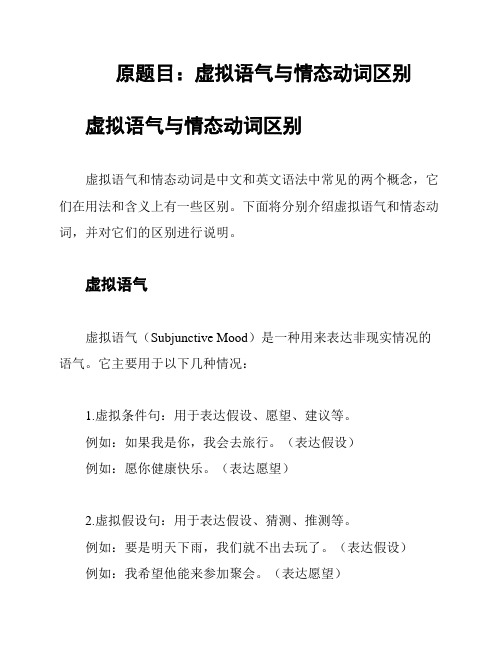
原题目:虚拟语气与情态动词区别虚拟语气与情态动词区别虚拟语气和情态动词是中文和英文语法中常见的两个概念,它们在用法和含义上有一些区别。
下面将分别介绍虚拟语气和情态动词,并对它们的区别进行说明。
虚拟语气虚拟语气(Subjunctive Mood)是一种用来表达非现实情况的语气。
它主要用于以下几种情况:1.虚拟条件句:用于表达假设、愿望、建议等。
例如:如果我是你,我会去旅行。
(表达假设)例如:愿你健康快乐。
(表达愿望)2.虚拟假设句:用于表达假设、猜测、推测等。
例如:要是明天下雨,我们就不出去玩了。
(表达假设)例如:我希望他能来参加聚会。
(表达愿望)3.虚拟感叹句:用于表达感叹、遗憾等。
例如:唉,要是我早点知道就好了。
(表达感叹)虚拟语气在中文中的表达方式较为灵活,通常通过上下文以及词语的语气来进行判断。
情态动词情态动词(Modal Verbs)是一类用来表示说话人的态度、能力、推测等的动词。
它们通常没有人称和数的变化,且后面一般接不定式。
常见的情态动词包括:可以、能够、会、必须、应该、愿意等。
情态动词在句子中具有以下几个特点:1.可以用来表达能力、权利、许可等。
例如:我可以帮你做作业。
(表达能力)例如:你可以去看电影。
(表达许可)2.可以用来表达推测、可能性等。
例如:他可能会来参加晚会。
(表达可能性)例如:明天可能会下雨。
(表达推测)3.可以用来表示意愿、建议等。
例如:你应该多锻炼身体。
(表达建议)例如:我愿意帮助你。
(表达意愿)情态动词在英文中有一定的变化规律,例如在一般现在时中,第三人称单数要加“s”。
区别虚拟语气和情态动词的区别主要体现在以下几个方面:1.虚拟语气用于表达非现实情况,而情态动词则用于表达说话人的态度、能力、推测等。
2.虚拟语气的用法较为固定,而情态动词的用法较为灵活。
3.虚拟语气在中文中的表达方式通常通过上下文以及词语的语气来判断,而情态动词则具有一定的变化规律。
在具体的语言表达中,我们需要根据上下文和语境来判断应该使用虚拟语气还是情态动词,以确保符合语法和意义的要求。
语法中的情态动词与虚拟语气的用法

语法中的情态动词与虚拟语气的用法在语法中,情态动词和虚拟语气都是重要的概念。
它们在句子中起到不同的作用,用法也各有特点。
本文将详细介绍情态动词和虚拟语气的用法,并指导读者如何正确运用它们。
一、情态动词的用法情态动词是英语中的一类特殊动词,包括can、could、may、might、shall、should、will、would、must等。
它们通常用来表达说话人的意愿、能力、推测、建议等。
1. 表示能力与可能性情态动词can和could常用来表示能力和可能性。
例如:"She can swim."(她会游泳。
)"I could understand the movie."(我能理解电影。
)在这些句子中,can和could表达了能力与可能性的概念。
2. 表示推测与可能性情态动词may和might用于表示可能性和推测。
例如:"It may rain tomorrow."(明天可能会下雨。
)"She might be late for the meeting."(她可能会迟到会议。
)在这些句子中,may和might表达了对未来事件的推测。
3. 表示义务与建议情态动词should常用于表示义务和建议。
例如:"You should take a break."(你应该休息一下。
)"We should recycle to protect theenvironment."(我们应该回收以保护环境。
)在这些句子中,should表达了建议和应该做的事情。
4. 表示意愿与请求情态动词will和would通常用于表示意愿和请求。
例如:"I will help you with your homework."(我会帮你做作业。
)"Would you please pass me the salt?"(请你递给我盐吗?)在这些句子中,will和would 表达了说话人的意愿和请求。
语法篇专题情态动词和虚拟语气

用法
例句
can和could
表示能力
He can speak English better than you.
表示请求 或允诺?
You can have the book when I have finished it. Could you come again tomorrow?
表示客观可能性
should have done
过去本来应该……,而实际上没有……
The plant is dead. Maybe I should have given it more water.
ought to have done
过去本该……,而未……
You ought to have given him more help.
专题八 情态动词和虚拟语气
情态动词
一、情态动词 定义:情态动词是一种本身具有一定词义,但要与动词原形及其被动语态一起使用的词。它给谓语动词增添情态色彩,表示说话人对有关行为或事物的态度和看法,认为其可能、应该或必要等。 二、情态动词的特点 情态动词无人称和数的变化, 情态动词后面跟的动词需用原形,否定式构成是在情态动词后面加“not”。 个别情态动词有现在式和过去式两种形式, 过去式用来表达更加客气, 委婉的语气, 时态性不强, 可用于过去,现在或将来。情态动词属于非及物动词,故没有被动语态。
三、情态动词的语法特征 (1) 情态动词不能表示正在发生或已经发生的事情,只表示期待或估计某事的发生。 (2) 情态动词除ought 和have 外,后面只能接不带to 的不定式。 (3) 情态动词没有人称和数的变化,即其第三人称单数不加s。 (4) 情态动词没有非限定形式,即没有不定式,分词形式,也没有相应的动名词。 四、情态动词的基本用法
英语中常见的情态动词和虚拟语气的运用

英语中常见的情态动词和虚拟语气的运用在英语语法中,情态动词和虚拟语气是我们经常会遇到的两个概念。
情态动词用来表示说话人的态度、意愿、能力、推测等,而虚拟语气则用来表示与事实相反的假设、愿望或建议。
本文将详细介绍英语中常见的情态动词和虚拟语气的用法。
一、情态动词的用法1. Can: 表示能力或许可。
例如:- I can swim.(我会游泳。
)- Can I use your pen?(我可以用你的钢笔吗?)2. Could: 表示过去的能力或请求。
例如:- I could run faster when I was younger.(我年轻的时候跑得更快。
)- Could you please pass me the salt?(请你把盐递给我好吗?)3. May: 表示许可或可能性。
例如:- May I go to the restroom?(我可以去洗手间吗?)- It may rain tomorrow.(明天可能会下雨。
)4. Might: 表示可能性较小或委婉的请求。
例如:- He might be late for the meeting.(他可能会迟到会议。
)- Might I ask you a question?(我可以问你一个问题吗?)5. Must: 表示必须或推测的肯定。
例如:- You must finish your homework before going out.(你必须在出门前完成作业。
)- It must be cold outside.(外面一定很冷。
)6. Should: 表示应该或建议。
例如:- You should eat more fruits and vegetables.(你应该多吃水果和蔬菜。
)- We should arrive at the airport early.(我们应该早点到达机场。
)7. Would: 表示愿意或过去的习惯。
例如:- Would you like a cup of tea?(你想喝杯茶吗?)- When I was young, I would play soccer every day.(我小时候每天都会踢足球。
虚拟语气的表示方式和情态动词的运用

虚拟语气的表示方式和情态动词的运用虚拟语气(Subjunctive Mood)是一种特殊的语气,用于表示非现实、假设或愿望等情况。
在英语中,虚拟语气通常通过使用情态动词来表达。
本文将介绍虚拟语气的表示方式以及情态动词的运用,帮助读者更好地掌握和运用这两个语法要点。
一、虚拟语气的表示方式虚拟语气主要通过以下几种方式来表示:1. 与现在事实相反的情况当表达与现在事实相反的情况时,虚拟语气通常使用"would/could/should + 动词原形"的形式。
例如:- If I were rich, I would buy a big house.(如果我富有,我就会买一栋大房子。
)2. 与过去事实相反的情况当表达与过去事实相反的情况时,虚拟语气通常使用"had + 过去分词"的形式。
例如:- If I had studied harder, I would have passed the exam.(如果我学习更努力一些,我就能通过考试了。
)3. 虚拟条件句虚拟条件句通常由"if"引导,表示假设情况。
在虚拟条件句中,谓语动词使用虚拟语气的形式,主句中则使用与其相应的情态动词。
例如:- If I were you, I would apologize.(如果我是你,我会道歉。
)二、情态动词的运用情态动词是英语中一类特殊的动词,用于表达能力、意愿、可能性等。
在虚拟语气中,情态动词常常与虚拟语气一同使用,以表达假设、建议、要求等不同的语义。
以下是情态动词在虚拟语气中的运用:1. "should"用于表示建议、要求或命令- It's important that he should arrive on time.(他能按时到达非常重要。
)2. "could"用于表示请求或提议- I wish you could help me with this assignment.(但愿你能帮我完成这个作业。
什么是虚拟语气的情态动词

什么是虚拟语气的情态动词?虚拟语气(Subjunctive Mood)是英语中用于表达假设、愿望、建议、命令等非真实情况的一种语气形式。
在虚拟语气中,情态动词(Modal Verbs)在某些情况下会出现特殊的形式来表示虚拟语气。
以下是一些常见的情态动词在虚拟语气中的用法:1. could:-表示能力或可能性的虚拟:He could win the game if he practiced more.(如果他多练习的话,他可能会赢得比赛。
)-表示礼貌的虚拟:Could you please pass me the salt?(你能给我递一下盐吗?)2. would:-表示愿望或假设的虚拟:I wish he would come to the party.(我希望他能来参加派对。
)-表示请求或建议的虚拟:I would suggest that you study harder for the exam.(我建议你为考试更加努力学习。
)3. might:-表示可能性的虚拟:It might rain tomorrow, so bring an umbrella.(明天可能会下雨,所以带把伞。
)4. should:-表示建议或命令的虚拟:He should apologize for his behavior.(他应该为自己的行为道歉。
)5. had better:-表示建议或命令的虚拟:You had better be on time for the meeting.(你最好准时参加会议。
)6. ought to:-表示责任或建议的虚拟:She ought to help her parents with the housework.(她应该帮助父母做家务。
)在使用情态动词时,需要注意以下几点:-情态动词一般不加s,即第三人称单数形式和其他人称形式一样。
-在虚拟语气中,情态动词后面的动词一般使用原形,例如:I wish I could go.(我希望我能去。
情态动词的虚拟语气
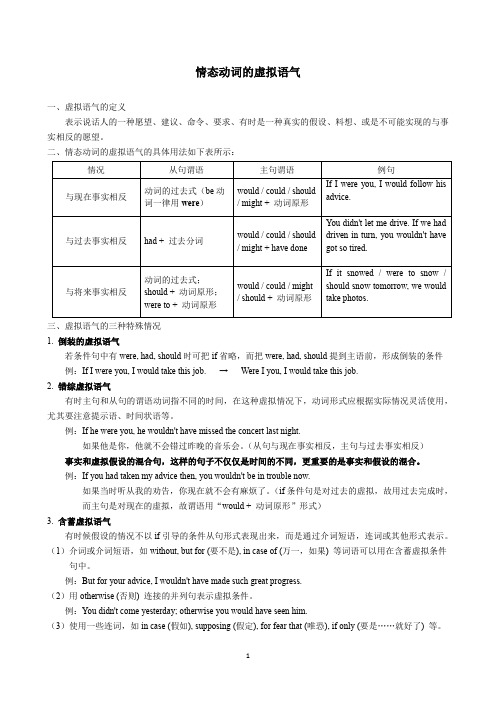
情态动词的虚拟语气一、虚拟语气的定义表示说话人的一种愿望、建议、命令、要求、有时是一种真实的假设、料想、或是不可能实现的与事实相反的愿望。
二、情态动词的虚拟语气的具体用法如下表所示:三、虚拟语气的三种特殊情况1. 倒装的虚拟语气若条件句中有were, had, should时可把if省略,而把were, had, should提到主语前,形成倒装的条件例:If I were you, I would take this job. → Were I you, I would take this job.2. 错综虚拟语气有时主句和从句的谓语动词指不同的时间,在这种虚拟情况下,动词形式应根据实际情况灵活使用,尤其要注意提示语、时间状语等。
例:If he were you, he wouldn't have missed the concert last night.如果他是你,他就不会错过昨晚的音乐会。
(从句与现在事实相反,主句与过去事实相反)事实和虚拟假设的混合句,这样的句子不仅仅是时间的不同,更重要的是事实和假设的混合。
例:If you had taken my advice then, you wouldn't be in trouble now.如果当时听从我的劝告,你现在就不会有麻烦了。
(if条件句是对过去的虚拟,故用过去完成时,而主句是对现在的虚拟,故谓语用“would + 动词原形”形式)3. 含蓄虚拟语气有时候假设的情况不以if引导的条件从句形式表现出来,而是通过介词短语,连词或其他形式表示。
(1)介词或介词短语,如without, but for (要不是), in case of (万一,如果) 等词语可以用在含蓄虚拟条件句中。
例:But for your advice, I wouldn't have made such great progress.(2)用otherwise (否则) 连接的并列句表示虚拟条件。
情态动词与虚拟语气

情态动词与虚拟语气情态动词是英语中一类特殊的动词,它们用于表达说话人的情态、态度、能力、推测和意愿等,如can、could、may、might、shall、should、will、would、must等。
而虚拟语气则是一种语法形式,用来表示非真实、假设、愿望、建议、命令等。
情态动词和虚拟语气常常结合使用,以表达一定的假设、愿望或建议等含义。
一、情态动词的用法1. 表示能力和许可:can、could、may、might情态动词can表示一种能力或技能,表示某人有能力完成某事。
例如:He can play the piano very well.(他弹钢琴弹得很好。
)情态动词could表示过去的能力或技能,常用于否定句或疑问句中。
例如:I couldn't find my keys this morning.(今天早上我找不到我的钥匙。
)情态动词may和might表示允许或许可的意思,也可以表示推测或猜测。
注意may是一种程度上更强的允许,而might则程度上会稍微弱一些。
例如:You may leave the party early if you want.(如果你愿意,你可以早点离开派对。
)I might go to the movies tonight.(今晚我可能去看电影。
)2. 表示推测和猜测:must、should、would情态动词must表示说话人确定的推测和猜测,表示事实的推测,带有较强的肯定意义。
例如:She must be tired after running a marathon.(她参加完马拉松赛后一定很累。
)情态动词should表示一种合理的推测和猜测,表示根据某种常理或按照经验而做出的推测。
例如:He should be at home now because he usually comes back at this time.(他应该在家,因为他通常在这个时间回来。
虚拟语气的情态动词

虚拟语气的情态动词虚拟语气是用来表达一种不真实或者不确定的情况。
在英语中,虚拟语气通常通过使用情态动词来实现。
情态动词包括can, could, may, might, will, would, shall, should, must等等。
这些情态动词可以用于表达虚拟条件、建议、要求、推测、愿望等等。
1. 虚拟语气的用法1.1 虚拟条件句在虚拟条件句中,我们使用“if”引导从句来表达一个与现实相反的条件。
通常情态动词“would”用于主句中。
例句1:If I were you, I would study harder.如果我是你,我会更加努力学习。
例句2:If it rained tomorrow, we would stay at home.如果明天下雨,我们会待在家里。
1.2 虚拟建议虚拟语气也可以用于表示建议或者要求。
在这种情况下,我们使用情态动词“should”或者“would”来表示建议、要求或者命令。
例句3:I suggest that he should go to bed early.我建议他早点上床睡觉。
例句4:He demanded that she leave immediately.他要求她立刻离开。
1.3 虚拟推测虚拟语气还可以用于表示推测、猜测或者怀疑。
在这种情况下,我们通常使用情态动词“may”, “might”或者“could”。
例句5:He may have missed the bus.他可能错过了公共汽车。
例句6:They could be at the cinema.他们可能在电影院里。
1.4 虚拟愿望虚拟语气还可以用于表示愿望、理想以及虚构的情节。
在这种情况下,我们通常使用情态动词“would”。
例句7:I wish I could travel the world.我希望我能够环游世界。
例句8:If I were rich, I would buy a mansion.如果我有钱的话,我会买一座豪宅。
高中英语2025届高考语法复习情态动词与虚拟语气知识讲解
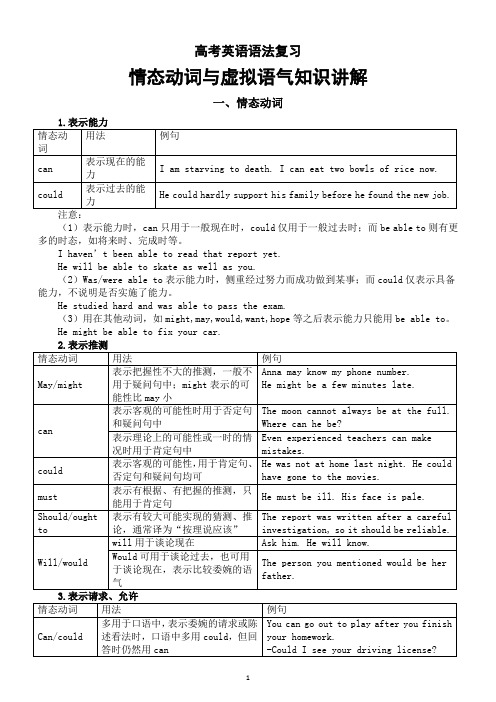
高考英语语法复习情态动词与虚拟语气知识讲解一、情态动词(1)表示能力时,can只用于一般现在时,could仅用于一般过去时;而be able to则有更多的时态,如将来时、完成时等。
I haven’t been able to read that report yet.He will be able to skate as well as you.(2)Was/were able to表示能力时,侧重经过努力而成功做到某事;而could仅表示具备能力,不说明是否实施了能力。
He studied hard and was able to pass the exam.(3)用在其他动词,如might,may,would,want,hope等之后表示能力只能用be able to。
He might be able to fix your car.(1)must还可以表示质问或感情色彩,意为“偏要,偏偏”。
Why must it snow on Saturday?(2)should还可以表示惊奇、愤怒、失望等特殊情感,尤其用在以why,who,how等开头的疑问句中或某些感叹句中。
why should you be so late today?(1)must作“必须”讲的一般疑问句,其肯定回答用must,否定回答用needn’t或don’t have to。
-Must I pay now?-Yes, you must./No, you needn’t.(2)need还可以作实义动词,有人称和数的变化,后跟带to的不定式作宾语。
She needed to go out for a walk.(1)两者在表示过去的习惯动作或行为时常可通用。
When we were children, we would/used to go skating every winter.(2)Used to与would都不能与表示具体频率、次数的词及特定的时间状语或具体的一段时间连用。
情态动词和虚拟语气
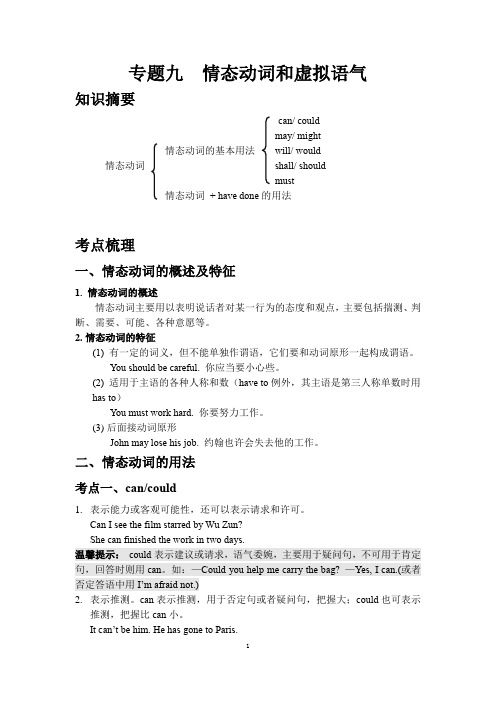
专题九情态动词和虚拟语气知识摘要can/ couldmay/ might情态动词的基本用法will/ would情态动词shall/ shouldmust情态动词+ have done的用法考点梳理一、情态动词的概述及特征1. 情态动词的概述情态动词主要用以表明说话者对某一行为的态度和观点,主要包括揣测、判断、需要、可能、各种意愿等。
2.情态动词的特征(1) 有一定的词义,但不能单独作谓语,它们要和动词原形一起构成谓语。
You should be careful. 你应当要小心些。
(2) 适用于主语的各种人称和数(have to例外,其主语是第三人称单数时用has to)You must work hard. 你要努力工作。
(3)后面接动词原形John may lose his job. 约翰也许会失去他的工作。
二、情态动词的用法考点一、can/could1.表示能力或客观可能性,还可以表示请求和许可。
Can I see the film starred by Wu Zun?She can finished the work in two days.温馨提示:could表示建议或请求,语气委婉,主要用于疑问句,不可用于肯定句,回答时则用can。
如:—Could you help me carry the bag? —Yes, I can.(或者否定答语中用I’m afraid not.)2.表示推测。
can表示推测,用于否定句或者疑问句,把握大;could也可表示推测,把握比can小。
It can’t be him. He has gone to Paris.Look! Someone is coming! Who can it be?3.用于陈述句中,表示理论上或者习惯上的可能性。
It can be quite cold here in winter.It could be very exciting to go out for a drive.【知识拓展】1. 辨析:can、be able to 和could(1)can只有现在和过去时,而be able to则有更多的时态变化。
- 1、下载文档前请自行甄别文档内容的完整性,平台不提供额外的编辑、内容补充、找答案等附加服务。
- 2、"仅部分预览"的文档,不可在线预览部分如存在完整性等问题,可反馈申请退款(可完整预览的文档不适用该条件!)。
- 3、如文档侵犯您的权益,请联系客服反馈,我们会尽快为您处理(人工客服工作时间:9:00-18:30)。
1. ——I don’t really like James. Why did you invite him?——Don’t worry. He come. He said he wasn’t certain what his plans were.A. must notB. need notC. would notD. might not2. ——Where are the children? The dinner’s going to be complet ely ruined.——I wish they always late.A. weren’tB. hadn’t beenC. wouldn’t beD. wouldn’t have been3. ——Pity you missed the lecture on nuclear pollution.——I it, but I was busy preparing for a job interview.A. attendedB. had attendedC. would attendD. would have attended4. ——I left my handbag on the train, but luckily someone gave it to a railway official.——How unbelievable to get it back! I mean, someone ______ it.A. will have stolenB. might have stolenC. should have stolenD. must have stolen5. We ________ here at lunch time; we were delayed at the airport, though.A.could be B.should be C.must have been D.would have been6. ——How’s your new babysitter?——We ________ask for a better one. All our kids love her so much.A. shouldB. mightC. mustn‘tD. couldn’t7. ——Why didn’t you come to Simon’s party last night?—— I wanted to ,but my mom simply _________ not let me out so late at night.A. couldB. mightC. wouldD. should8. —This is the first time I ________ my first picture with my own hands.—It is time that you ________ a picture for me.A.took; took B.have taken; took C.took; will take D.will take; have taken9. —Who is the girl standing over there?—Well,if you know,her name is Mabel.A. mayB. canC. mustD. shall10. We _____John’s name on the race list yesterday but f or his recent injury.A. will putB. will have putC. would putD. would have put11.Jack described his father, who _______a brave boy many years ago, as a strong–willed manA. would beB. would have beenC. must beD. must have been12. I have told you the truth. ______ I keep repeating it?A MustB CanC MayD Will13. —I didn’t attend the lecture yesterday. —I________,either,if my mother hadn’t reminded me.A.wouldn’t B.wouldn’t have C.didn’t D.hadn’t14. —Why hasn't Jack come back yet?________anything have happened to him?—I'm not sure, but I guess something________.A.May;must have B.Can;may have C.Must;may D.Dare;might have15. —I haven’t got the reference book yet, but I’ll have a test on the subject next month.—Don’t worry. You______ have it by Friday.A. couldB. shallC. mustD. may w_16. --- May I take this book out of the reading room? ----- No, you . You read it in here.A. mightn’tB. won’tC. needn’tD. mustn’t17. ---Good morning. I've got an appointment with Miss Smith in the Personnel Department.--Ah, good morning. You be Mrs. Peters.A. mightB. mustC. wouldD. can18. George is going to talk about the geography of his country, but I’d rather he____ more on its culture.A. focusB. focusedC. would focusD. had focused20. Some people who don’t like to talk much are not necessarily shy;they just be quiet people.A. mustB. mayC. shouldD. would21.One of the few things you ____ say about English people with certainty is that they talk a lot about the weather.A. needB. mustC. shouldD. can22. —I don’t care what people think. —Well, you _______A. couldB. wouldC. shouldD. might23. This printer is of good quality. If it ______ break down within the first year, we would repair it at our expense.A. wouldB. shouldC. couldD. might24. He did not regret saying what he did but felt that he it differently.A. could expressB. would expressC. could have expressedD. must have expressed25. Lisa well not want to go on the trip—she hates traveling.A. willB. canC. mustD. may26. What a pity! Considering his ability and experience,he better.A. need have doneB. must have doneC. can have doneD. might have done27. —The contest is so easy,but you fail to pass it. —I’m sorry it be this way.A. couldB. shouldC. shallD. would29. It is usually warm in my hometown in March,but it be rather cold sometimes.A. mustB. canC. shouldD. would30. Peter be really difficult at times even though he’s a nice person in general.A. shallB. shouldC. canD. must31.—What do you think we can do for our aged parents?—You do anything except to be with them and be yourself.A. don’t have toB. oughtn’t toC. mustn’tD. can’t32. —My cat’s really fat.—You have given her so much food.A. wouldn’tB. couldn’tC. shouldn’tD. mustn’t33. They ________two free tickets to Canada,otherwise they’d never have been able to afford to go.A. had gotB. gotC. have gotD. get34. fired,your health care and other benefits will not be immediately cut off.A. Would you beB. Should you beC. Could you beD. Might you be35. —Why didn’t you attend Linda’s wedding?—I wouldn’t like to . It is strange that she _____ have married to that good-for-nothing guy.A.would B.should C.could D.must36. I________ here earlier. I never thought the car would break down halfway.A. could comeB. should comeC. would have comeD. may have come37. He paid for a seat,however,he free.A.could have enteredB. would have enteredC. could enterD. may enter38. ----His wife is seriously ill but he should be so lighted-hearted.----He____have learnt about it, or he______ be that cheerful.A. can’t; mustn’tB. cannot; may notC. may; cannotD. may not; cannot39. Not every prisoner______ travel, and we have strict and fair regulations. Those selected ______ have performed well in the prison and are going to be released soon.A. can, couldB. should, mightC. can ,mustD. may ,should40. I ________buy the overcoat if the shop owner lower the price.A.may, must B.will, should C.shall, could D.am going to ,will41. If you want to book tickets for the 2012 Olympic Games, just call 00952012.It ___ be simpler.A.mustn't B.won't C.needn't D.couldn't42. —It’s hard to believe that Jack ________ have fought with the policeman.—Yes. If one ________ ask for trouble, it can’t be helped.A. would; willB. must; mayC. should; mustD. need; dare43. --Johnson, come and look at the sea! I t is beautiful, isn’t it?--Absolutely! If only I _________ here by the sea.A. livedB. liveC. had livedD. will live44. —When shall we meet your cousin at the station?—His plane took off 2 hours ago, and it reach at 5 p.m.A.should B.could C.must D.can45. —Has Tim started? He said he would join in the party. —He . He is a man of his word.A. could have leftB. must have leftC. can’t comeD. won’t be coming46. —Where is Lucy?—I can’t say where she is, but she________ have gone to meet her classmates, for they want to go to Sichuan to work as volunteers.A.can B.should C.must D.may47. —A medical team was sent to Japan by air five hours ago.—So they _____ have arrived by now.The flight usually takes four hours or so.A.might B.could C.must D.need48. __________ the clouds, you would find the airplane in the sky easilyA.Had it not been for B.If it were notC.If it had not been for D.Were it not for49. Why were you driving so fast? You somebody.A. might hurtB. might have hurtC. would hurtD. must have hurt50. Tom have come in person.He came such a long way just to tell us the result.A.mustn’t B.needn’t C.wouldn’t D.couldn’t51. --- You a meal for me this evening. I had dinner at the Chinese Dragon with Tom.--- Well, why didn’t you phone and let me know?A.should cook B.needn’t have cooked C.don’t n eed to cook D.should have cooked52. If only I _____ a few days ago!Then I wouldn’t have been feeling so worried now.A.looked ahead B.could look ahead C.were to look ahead D.had looked ahead 53. ------ Can I pay the bill by check ?------ Sorry, sir. But it is the management rules of our hotel that payment _______ be made in cash.A. shallB. canC. willD. may54.----It’s really a pity that I didn’t see you in Shanghai.----I _________ to see you in the hotel, but I was too busy.A.hope B.had hoped C.hoped D.am hoping55. ------ The research on the new swine flu virus vaccine is challenging and demanding.-----Who do you think can do the job?------- ____ my students have a try?A.Shall B.Must C.Will D.May56.Rose _________ tell her mother that she didn’t pass the exam.A.dare not to B.doesn’t dare to C.doesn’t dare D.dares not57. She insisted that she ______ not guilty , but we insisted that she ____ into prisonA.was; be put B.be ; was put C.should be; was put D.was; should put58. ---Alice, let’s go to the supermarket and buy some food.---Sorry, Mike ____ come to see me this afternoon so I’d better stay at home in case he comes.A. canB. mayC. mustD. will59. It ______ heavily when he got back home for he was wet all over.A. was rainingB. must have been rainingC. must be rainingD. rained60 ., we could forgive him for his mistakes!A.Were he still a child B.If he is still a childC.Did he realize he is wrong D.He were still a child61.It is high time that the child to the hospital.A.is sent B.would be sent C.be sent D.were sent62. I waited ages for you – you have said that you weren’t coming!A.could B.would C.might D.must63. ---Ann looks hot and dry. ---So you if you had a high fever.A. doB. areC. willD. would64. ----You just think of yourself! You kept me waiting for at least three hours.----I am sorry that you _____ think so.A.would B.might C.could D.should65. Look at the floor, Tom!________you watch TV while having a meal?A.Should B.Could C.Would D.Must66. Those farmers who _________ move from place to place with their animals in the past have moved intonew houses at last.A. couldB. mightC. wouldD. should67. ---Jenny took the 8:00 bus to Guangzhou this morning.---Really? He the 9:00 train. It’s much more comfortable and safer to travel by train.A.could have taken B.should take C.must have taken D.can take68. —Hi, Johnson, any idea where Susan is? —It’s class time, so she ______ in the classroom now.A. can beB. must have beenC. might have beenD. should be69. — How I want to have studied harder when I was in school.—If you _________, you wouldn’t work into late every day nowadays.A. didB. shouldC. hadD. would70. --- ________ he come and visit you as planned?--- Of course. And I’d rather he ________ me what he saw with his own eyes in Greece.A. Will; will tellB. Shall; toldC. Shall; will tellD. Will; told。
